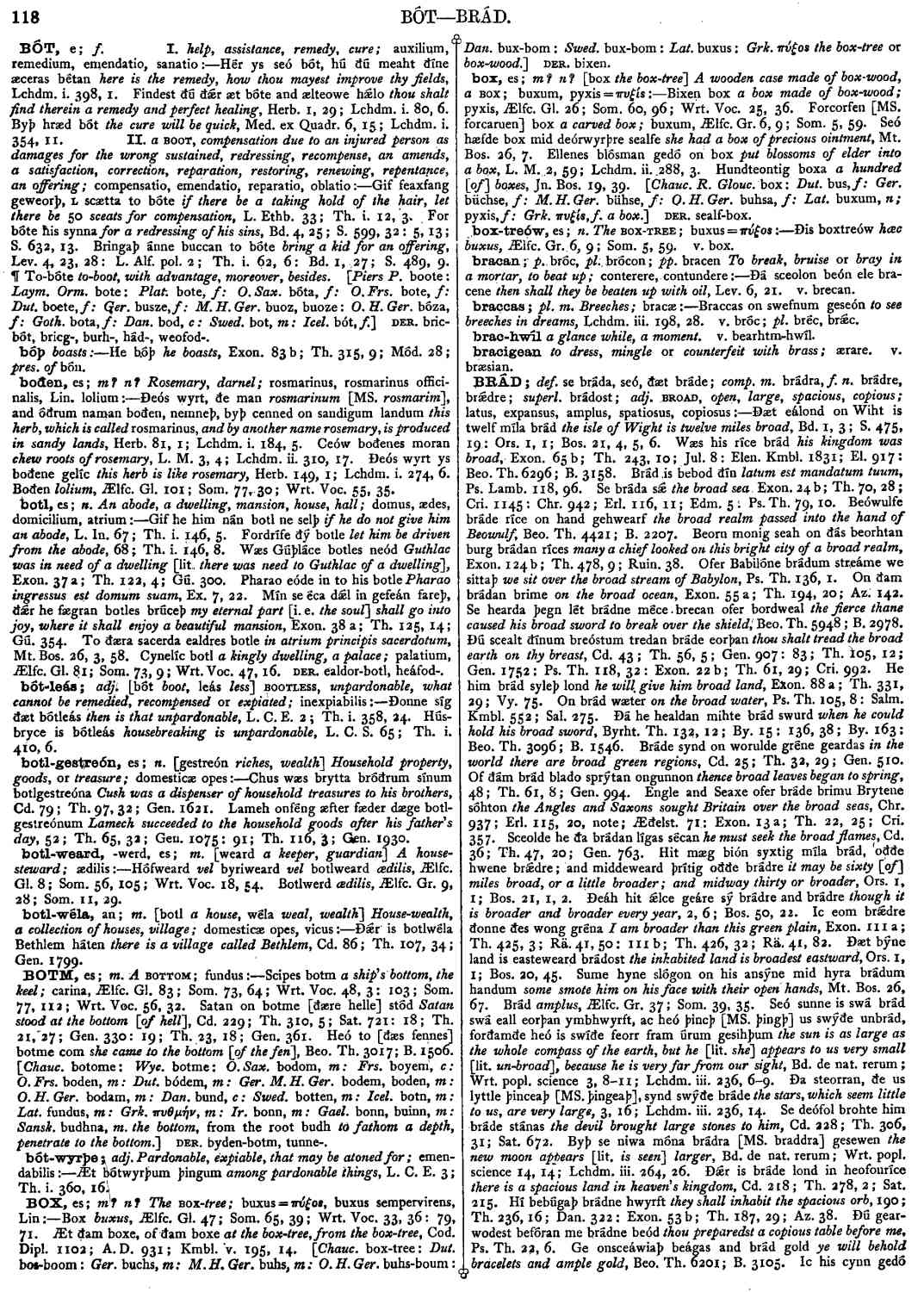BRÁD
- adjective
-
Ðæt eálond on Wiht is twelf míla brád
the isle of Wight is twelve miles broad,
- Bd. 1, 3; S. 475, 19: Ors. 1, 1; Bos. 21, 4, 5, 6.
-
Wæs his ríce brád
his kingdom was broad,
- Exon. 65 b; Th. 243, 10; Jul. 8: Elen. Kmbl. 1831; El. 917: Beo. Th.
6296; B. 3158.
-
Brád is bebod ðín
latum est mandatum tuum,
- Ps. Lamb. 118, 96.
-
Se bráda sǽ
the broad sea.
- Exon, 24 b; Th. 70, 28; Cri. 1145: Chr. 942; Erl. 116, 11; Edm. 5, Ps.
Th. 79, 10.
-
Beówulfe bráde ríce on hand gehwearf
the broad realm passed into the hand of Beowulf,
- Beo. Th. 4421; B. 2207.
-
Beorn monig seah on ðás beorhtan burg brádan ríces
many a chief looked on this bright city of a broad realm,
- Exon. 124 b; Th, 478, 9; Ruin. 38.
-
Ofer Babilóne brádum streáme we sittaþ
we sit over the broad stream of Babylon,
- Ps. Th. 136, 1.
-
On ðam brádan brime
on the broad ocean,
- Exon. 55 a; Th. 194, 20; Az. 142.
-
Se hearda þegn lét brádne méce brecan ofer bordweal
the fierce thane caused his broad sword to break over the shield,
- Beo. Th. 5948; B. 2978.
-
Ðú scealt ðínum breóstum tredan bráde eorþan
thou shalt tread the broad earth on thy breast,
- Cd, 43; Th. 56, 5; Gen. 907: 83; Th. 105, 12; Gen. 1752: Ps. Th. 118, 32:
Exon. 22 b; Th. 61, 29; Cri. 992.
-
He him brád syleþ lond
he will give him broad land,
- Exon. 88 a; Th. 331, 29; Vy. 75.
-
On brád wæter
on the broad water,
- Ps. Th. 105, 8: Salm. Kmbl. 552; Sal. 275.
-
Ðá he healdan mihte brád swurd
when he could hold his broad sword,
- Byrht. Th. 132, 12; By. 15: 136, 38; By. 163: Beo. Th. 3096; B.
1546.
-
Bráde synd on worulde gréne geardas
in the world there are broad green regions,
- Cd. 25; Th. 32, 29; Gen. 510.
-
Of ðám brád blado sprýtan ongunnon
thence broad leaves began to spring,
- 48; Th. 61, 8 ; Gen. 994.
-
Engle and Seaxe ofer bráde brimu Brytene sóhton
the Angles and Saxons sought Britain over the broad seas,
- Chr. 937; Erl. 115, 20, note; Æðelst. 71: Exon. 13 a; Th. 22, 25; Cri.
357.
-
Sceolde he ða brádan lígas sécan
he must seek the broad flames,
- Cd. 36; Th, 47, 20; Gen. 763.
-
Hit mæg bión syxtig míla brád, oððe hwene brǽdre; and middeweard þrítig oððe brádre
it may be sixty [of] miles broad, or a little broader; and midway thirty or broader,
- Ors. 1, 1; Bos. 21, 1, 2.
-
Ðeáh hit ǽlce geáre sý brádre and brádre
though it is broader and broader every year,
- 2, 6; Bos. 50, 22.
-
Ic eom brǽdre ðonne ðes wong gréna
I am broader than this green plain,
- Exon. 111 a; Th. 425, 3; Rä. 41, 50: 111 b; Th, 426, 32; Rä. 41,
82.
-
Ðæt býne land is easteweard brádost the inhabited land is broadest eastward, Ors. 1, 1; Bos. 20. 45, Sume hyne slógon on his ansýne mid hyra brádum handum
some smote him on his face with their open hands,
- Mt. Bos. 26, 67.
-
Brád
amplus,
- Ælfc. Gr. 37; Som. 39, 35.
-
Seó sunne is swá brád swá eall eorþan ymbhwyrft, ac heó þincþ [MS. þingþ] us swýðe unbrád, forðamðe heó is swíðe feorr fram úrum gesihþum
the sun is as large as the whole compass of the earth, but he [lit. she] appears to us very small [lit. un-broad], because he is very far from our sight,
- Bd. de nat. rerum; Wrt. popl. science 3, 8-11; Lchdm. iii. 236,
6-9.
-
Ða steorran, ðe us lyttle þinceaþ [MS. þingeaþ], synd swýðe bráde
the stars, which seem little to us, are very large,
- 3, 16; Lchdm. iii. 236, 14.
-
Se deófol brohte him bráde stánas
the devil brought large stones to him,
- Cd. 228; Th. 306, 31; Sat. 672.
-
Byþ se niwa móna brádra [MS. braddra] gesewen
the new moon appears [lit. is seen] larger,
- Bd. de nat. rerum; Wrt. popl. science 14, 14; Lchdm. iii. 264,
26.
-
Ðǽr is bráde lond in heofonríce
there is a spacious land in heaven's kingdom,
- Cd. 218; Th. 278, 2; Sat. 215.
-
Hí bebúgaþ brádne hwyrft
they shall inhabit the spacious orb,
- 190; Th. 236, 16; Dan. 322: Exon. 53 b; Th. 187, 29; Az. 38.
-
Ðú gearwodest befóran me brádne beód
thou preparedst a copious table before me,
- Ps. Th. 22, 6.
-
Ge onsceáwiaþ beágas and brád gold
ye will behold bracelets and ample gold,
- Beo. Th. 6201; B. 3105.
-
Ic his cynn gedó brád and bresne
I will make his race large and powerful,
- Cd. 134; Th. 169, 17; Gen. 2801.
-
Brád earmbeáh
a broad or large arm-bracelet;
dextrocherium,- Ælfc. Gl. 114; Som. 80, 30; Wrt. Voc. 61,
10.
Bosworth, Joseph. “BRÁD.” In An Anglo-Saxon Dictionary Online, edited by Thomas Northcote Toller, Christ Sean, and Ondřej Tichy. Prague: Faculty of Arts, Charles University, 2014. https://bosworthtoller.com/4904.
Checked: 0